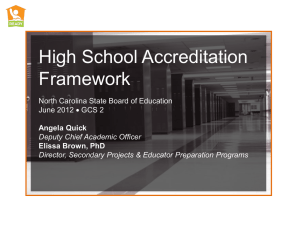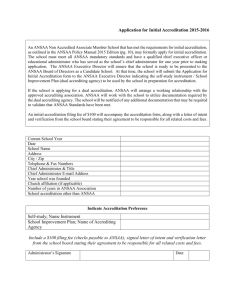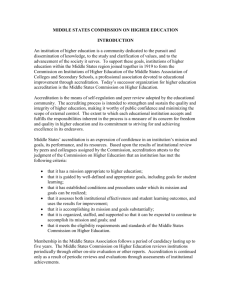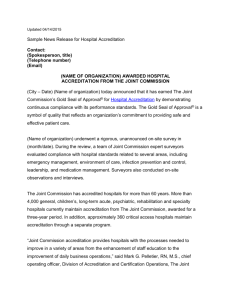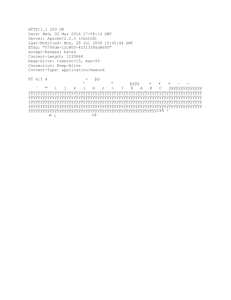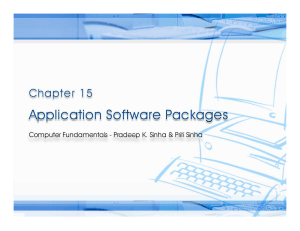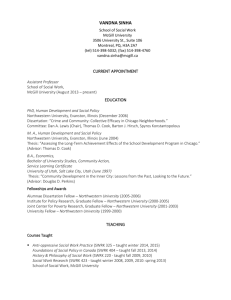IEEE Committee on Global Accreditation Activities Summary of
advertisement
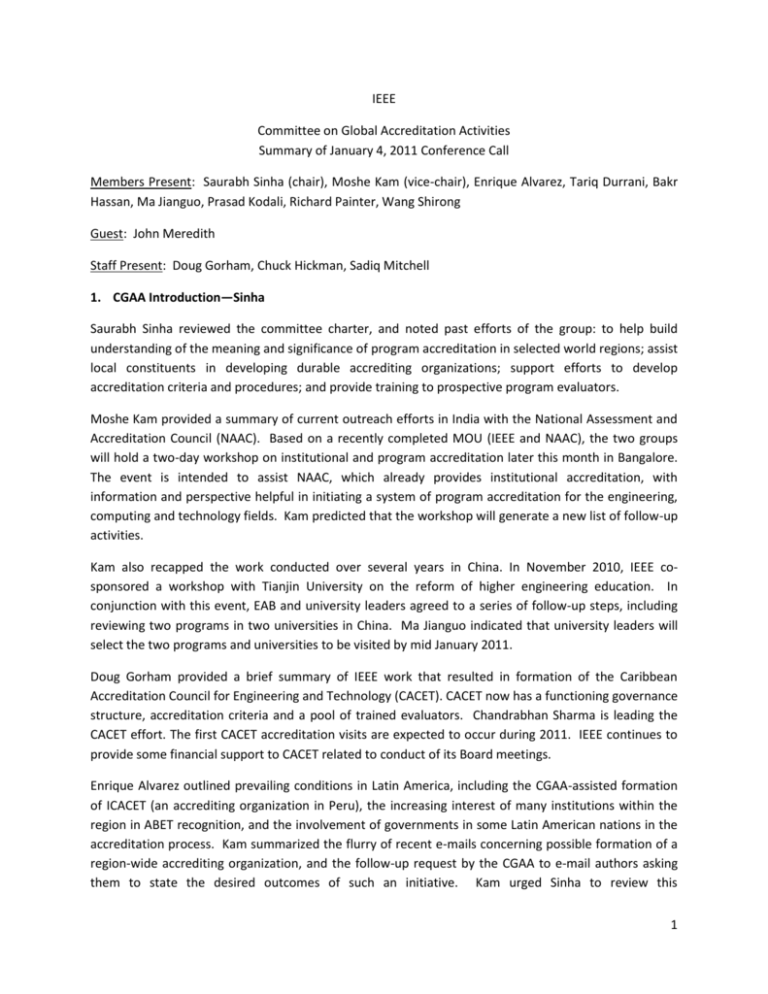
IEEE Committee on Global Accreditation Activities Summary of January 4, 2011 Conference Call Members Present: Saurabh Sinha (chair), Moshe Kam (vice-chair), Enrique Alvarez, Tariq Durrani, Bakr Hassan, Ma Jianguo, Prasad Kodali, Richard Painter, Wang Shirong Guest: John Meredith Staff Present: Doug Gorham, Chuck Hickman, Sadiq Mitchell 1. CGAA Introduction—Sinha Saurabh Sinha reviewed the committee charter, and noted past efforts of the group: to help build understanding of the meaning and significance of program accreditation in selected world regions; assist local constituents in developing durable accrediting organizations; support efforts to develop accreditation criteria and procedures; and provide training to prospective program evaluators. Moshe Kam provided a summary of current outreach efforts in India with the National Assessment and Accreditation Council (NAAC). Based on a recently completed MOU (IEEE and NAAC), the two groups will hold a two-day workshop on institutional and program accreditation later this month in Bangalore. The event is intended to assist NAAC, which already provides institutional accreditation, with information and perspective helpful in initiating a system of program accreditation for the engineering, computing and technology fields. Kam predicted that the workshop will generate a new list of follow-up activities. Kam also recapped the work conducted over several years in China. In November 2010, IEEE cosponsored a workshop with Tianjin University on the reform of higher engineering education. In conjunction with this event, EAB and university leaders agreed to a series of follow-up steps, including reviewing two programs in two universities in China. Ma Jianguo indicated that university leaders will select the two programs and universities to be visited by mid January 2011. Doug Gorham provided a brief summary of IEEE work that resulted in formation of the Caribbean Accreditation Council for Engineering and Technology (CACET). CACET now has a functioning governance structure, accreditation criteria and a pool of trained evaluators. Chandrabhan Sharma is leading the CACET effort. The first CACET accreditation visits are expected to occur during 2011. IEEE continues to provide some financial support to CACET related to conduct of its Board meetings. Enrique Alvarez outlined prevailing conditions in Latin America, including the CGAA-assisted formation of ICACET (an accrediting organization in Peru), the increasing interest of many institutions within the region in ABET recognition, and the involvement of governments in some Latin American nations in the accreditation process. Kam summarized the flurry of recent e-mails concerning possible formation of a region-wide accrediting organization, and the follow-up request by the CGAA to e-mail authors asking them to state the desired outcomes of such an initiative. Kam urged Sinha to review this 1 correspondence before determining how the CGAA should proceed. Sinha suggested that a meeting be scheduled in conjunction with the spring IEEE Region 9 conference to explore this topic in more depth. Alvarez was assigned to lead the effort in Region 9. Bakr Hassan described recent discussions about the formation of an accrediting organization in the Gulf region. He said several national governments are currently quite active in the accrediting process, and somewhat suspicious of proposals to create an organization that is both independent and regional in scope. A “writing team” is currently being formed to draft a declaration that builds the case for creation of such an independent organization. Rich Painter briefly described ABET’s global outreach efforts. He said these activities are inhibited by ABET requirements that program evaluators first participate in four U.S.-based campus visits, and by restrictions on the travel costs that ABET will cover for the training of new program evaluators. Sinha summarized the complex situation concerning mutual recognition of degrees among various nations in eastern and southern Africa, the role of the Engineering Council of South Africa (ECSA), and potential formation of an independent accreditation organization in the region. In response to a question by Sinha, Kam suggested that Sinha contact the Region 8 Educational Activities Subcommittee (EASC) to explore the best method of initiating contact with officials of the EUR-ACE recognition system for engineering and technology programs within the European Community. In response to a suggestion by Sinha, Kam said he would consider the best ways for the CGAA to communicate more completely and systematically with the educational activities subcommittees in IEEE regions 8, 9 and 10. 2. Short-Term Goals—Sinha Sinha asked each committee member to e-mail one or two proposed short-term (three-four month) goals for the committee to Chuck Hickman. These messages will be combined and used to frame further committee discussion. 3. Status of Global Accreditation Activities--Sinha Sinha also urged staff to make full use of the 2011 Sections Congress to make regional and local IEEE officials aware of CGAA activities and resources. Gorham agreed to do so, but observed that both financial and staff resources available to support CGAA efforts are fully committed for 2011. Kam, noting that many past CGAA activities have been episodic in nature, requested that staff develop, maintain and regularly circulate an action register listing follow-up steps, assignments and deadlines. 4. Activity Portals—Hickman Hickman briefly reviewed the activity portals created for the Gulf region and eastern/Southern Africa projects, and said similar resources can be created, as needed, to support outreach in other geographic regions. 2 5. Discussions John Meredith commented that a transition to a newer system of program accreditation may be needed, supported by technology. Sinha suggested the consideration (in the long-term) of a web-based portal to partly support the process. 6. Next Meeting The committee will meet again, via conference call, in late February or early March 2011. Doodle polls will be conducted to determine specific dates, and alternate start times for the call. 3


